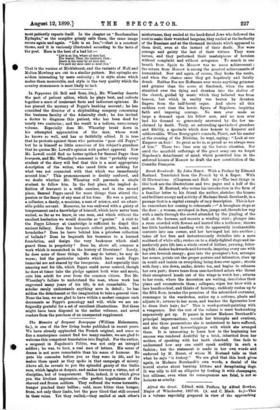In Pepysiana (G. Bell and Sons, 103.), Mr. Wheatley deserts
the part of patient editor, which he plays best, and collects together a mass of irrelevant facts and indiscreet opinions. He has pierced the mystery of Pepys's banking account ; he has consulted the director of a shipbuilding company concerning the business faculty of the Admiralty clerk ; he has invited a doctor to diagnose this patient, who has been dead for nearly two centuries ; and the result is a tedious, unnecessary volume. Especially does Mr. Wheatley break down in his attempted appreciation of the man, whose work he knows so well, and has so faithfully edited. It is true that he protests against those who patronise "poor old Pepys," but he is himself so little conscbus of his subject's grandeur that he quotes Mr. Lowell's opinion with perfect approval. Now Mr. Lowell could find no better epithet for Samuel Pepys than bourgeois, and Mr. Wheatley's comment is that "probably every student of the diary will feel that this is a most appropriate description of the writer, who cared little or nothing for what was not connected with that which was immediately around him." This pronouncement is doubly confused, and we doubt whether Mr. Wheatley will persuade a single student to follow him. In the first place, the implied de- finition of bourgeois is a trifle careless, and in the second place, Samuel Pepys eared for more things than stirred the passion or the fancy of any man of his time. He was a patriot, a collector, a dandy, a musician, a man of science, and an admir- able public servant. Moreover, he was endowed with a gaiety of temperament and a knowledge of himself, which have never been united, so far as we know, in one man, and which without the smallest hesitation we would describe as "genius." A visit to the Pepys Library at Cambridge is sufficient to dispel this ancient fallacy. Does the bourgeois collect prints, books, and broadsides ? Does he leave behind him a priceless collection of ballads ? Does he bequeath his treasures to a learned foundation, and design the very bookcases which shall guard them in perpetuity ? Does he, above all, compose a work which is unmatched in the history of literature ? Surely, he does none of these things. He may do better ; he may do worse ; but the particular talents which have made Pepys immortal are not shared by the bourgeoisie. And especially that amazing zest for life, which Pepys could never control, though he does at times take the pledge against both wine and music, cuts him adrift for ever from the common citizen. But Mr. -Wheatley's failure to understand the man, whose work has engrossed many years of his life, is not remarkable. The scholar rarely understands anything save in detail ; he has seldom the detachment or the imagination to take a general view. None the less, we are glad to have within a modest compass such documents as Pepys's genealogy and will, while we are un- feignedly grateful for a set of excellent illustrations. But these might have been disposed in the earlier volumes, and saved readers from the purchase of an unexpected supplement.


































 Previous page
Previous page